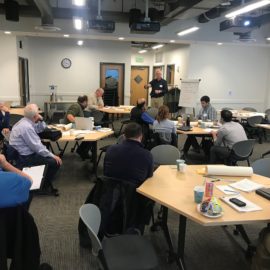
By Katrin Klingenberg
Executive Director and Co-Founder, Passive House Institute US, Inc. (PHIUS)
On October 29th I was fortunate to attend the NYSERDA low carbon and zero energy Buildings of Excellence Awards at the Building Energy Exchange in New York City. What a terrific time for projects that have employed and will employ PHIUS+ passive building standards as a baseline to get to zero energy ready! I estimated at least a dozen PHIUS+ projects in three categories: early design stage, substantial completion and completed, that were awarded up to 1 million dollars for their projects! The awards were announced on the 7th anniversary of super storm Sandy, not a coincidence, as a reminder for urgent climate action. Seven years later, NYC is leading by action and is putting itself firmly on the path of global leadership in building energy. Thank you to an amazingly dedicated NYSERDA team for making this happen!
And while a lot is happening on the East Coast, advocates have been working hard to get passive building into codes all over the country. A recent success: the Washington State Energy Code! But even more exciting is Washington state’s Housing Development Consortium of Seattle-King County recently launched its Exemplary Buildings Program. This initiative is following right on the heels of NYC’s first Buildings of Excellence winner announcements I mentioned earlier. Here also PHIUS+ passive building standards will provide a cost-effective efficiency and envelope baseline on the path to zero energy buildings. We are excited about this program and can’t wait to see the first buildings to go up and to help start promoting them and the program to even more project teams.
When PHIUS was first established our lofty mission was to make passive building code by 2020. As ambitious a goal that was back in 2007, we indeed have made significant progress and at the very least paved the path for nationwide success. New York State, Washington state and Massachusetts all have included passive building into their next stretch or state energy codes. Massachusetts has included an alternative compliance path for passive buildings and verification tools (no double modeling required) and Washington, D.C. also has included an alternate compliance path for passive buildings in their soon-to-be launched ZERO Energy Code.
Passive building is indeed the foundation for a successful energy transition and zero energy buildings and cities. Thank you to the Housing Development Consortium of Seattle-King County for their leadership in the West!


